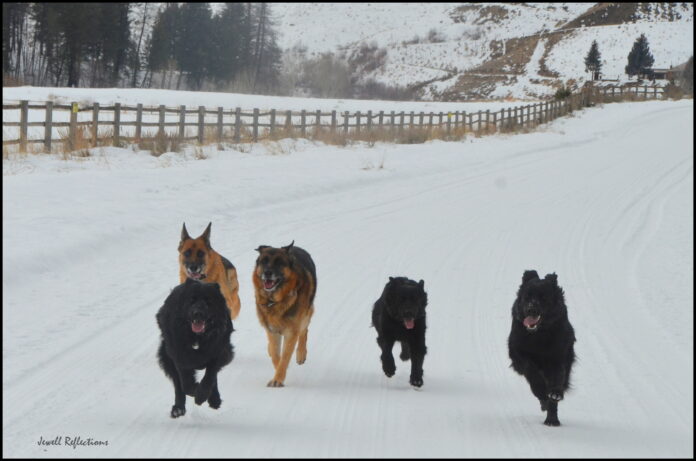
BY FRAN JEWELL

I’ve written about senior dogs before, but I haven’t always written about the quality of life for your senior dog. The veterinary community usually considers a dog that is about 8 years old to be a senior. I have an 11-and-a-half-year-old that is going amazingly strong—Brinx, who is Baewulf’s brother.
Many of you know I lost Baewulf very recently to a “cancer storm” that took him very quickly. I was very worried about Brinx because dogs that are close in age, especially siblings, tend to leave this world very close together. If their relationship is close, it’s hard for them without the other. Due to stress of the loss, many times the remaining sibling will become sick, as well. While I had two siblings that were very close, I don’t recommend it because it is so hard on both the remaining dog and for we humans to live through such loss.
Aside from the stress the emotional grieving takes on everyone, I think many times we miss or don’t look for the signs leading up to making “that” decision. When living with a dog, it can be extremely hard to know how our dog is truly feeling. Dogs, by nature, will hide their pain until it is unbearable for them. The reason for this is that dogs are pack animals. It is their nature to not show pain or it becomes a sign of weakness to the other pack members (both human and canine). It is not uncommon for us to miss subtle signs that tell us our dog is suffering.
For this reason, it is critical that you have an older dog medically supervised. Having your senior dog frequently visit your vet can cue you into problems you may not see. Depending on your dog’s breed or circumstances, you should ask your vet what that frequency of visits should be. In many cases, your veterinarian can also do many things to give your dog quality of life in those senior years.
So many times I see dogs limping along on walks, which is a clear sign of pain, perhaps from arthritis or other causes. If you have ever lived with arthritis, it is not fun. Chronic pain can make life miserable if it is not attended to. Other serious conditions can manifest themselves very quickly with a senior dog.
Be kind, compassionate and sensitive. Remember that dogs cannot tell you how they feel. Remember that they won’t be honest with you about how they feel. Give your senior dog the best quality of life by visiting your veterinarian and lovingly place your own feelings aside when it comes to making that final decision. It is a kind and heartfelt gift for our dog that has loved us so faithfully for so many years.
Fran Jewell is an Idaho Press Club award-winning columnist, IAABC-certified dog behavior consultant, NADOI-certified instructor #1096 and the owner of Positive Puppy Dog Training, LLC, in Sun Valley. For more information, visit positivepuppy.com or call (208) 578-1565.
